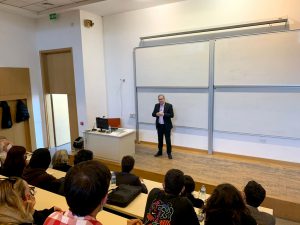 On the afternoon of November 17, guest speaker Alvaro Rodriguez delivered a talk titled “Our Common Agenda: A Greener, Sustainable, and More Peaceful Future for All.” Mr. Rodriguez is the current UN resident coordinator in Turkey and has served in the UN in different capacities since 1991. Having been in the organization for three decades now, he has witnessed firsthand the transformations the UN has undergone in the 21st century.
On the afternoon of November 17, guest speaker Alvaro Rodriguez delivered a talk titled “Our Common Agenda: A Greener, Sustainable, and More Peaceful Future for All.” Mr. Rodriguez is the current UN resident coordinator in Turkey and has served in the UN in different capacities since 1991. Having been in the organization for three decades now, he has witnessed firsthand the transformations the UN has undergone in the 21st century.
Mr. Rodriguez argued that as this new multilateral structure has been disappointing in its capacity to solve global issues, UN member states look to the UN secretary-general for guidance and new approaches. The speaker outlined the paradigmatic shifts the UN is undergoing in order to be an effective agent in this world of new problems and structural changes.
He compared the UN’s Millennium Development Goals (MDGs) of 2000 to its new Sustainable Development Goals (SDGs), pointing out that whereas the MDGs addressed problems individually, the approach behind the new SDGs is built on taking a more holistic strategy in its advancement of the green economy. These new goals are necessary because, as he put it, we are “at war with the planet.”
Mr. Rodriguez identified the triple planetary crises (climate change, loss of biodiversity and pollution) as inseparable from the triple social crises (poverty, youth unemployment and inequality). In his view, a good environment is unattainable without good social policy, and humans are too often left out of the conversation about solutions to the climate crisis. In other words, sustainable solutions are ones that consider the well-being of both the planet and its people.
Lastly, Mr. Rodriguez noted the shift from focusing on the immediate future to looking to the long-term future. Whereas the UN of the past was concerned primarily about the next 10 years, today’s UN is concerned about the future of the next several generations, because, he observed, the longer we put off solving the problems of today, the more costly they will be to solve tomorrow.
As Bilkent students proceeded to ask many questions regarding how the UN might address specific problems, Mr. Rodriguez maintained in his answers the importance of understanding the intertwined relationship between environmental and social issues.
